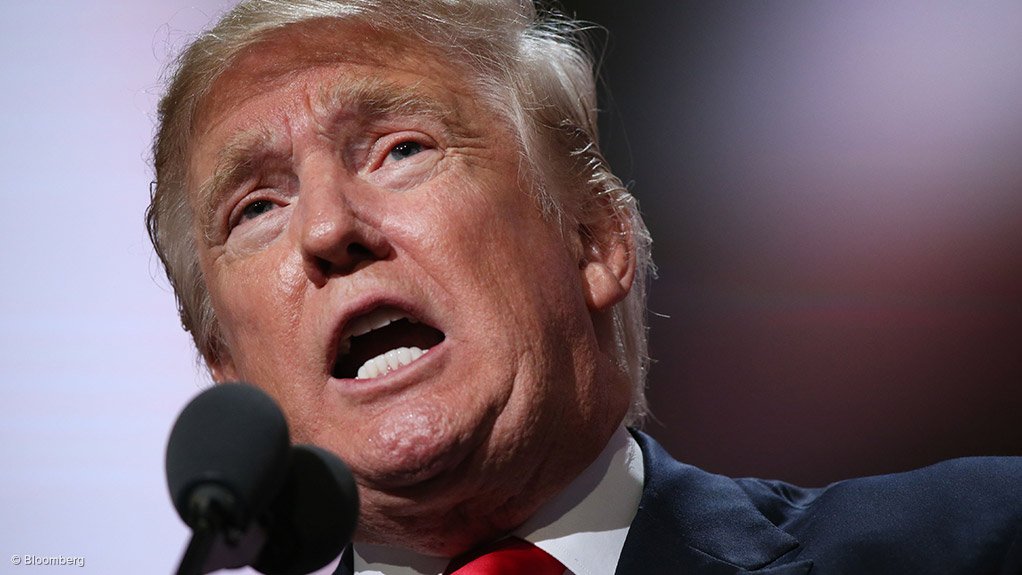Trade and Industry Minister Dr Rob Davies has made a formal submission to the US requesting the exclusion of South Africa from the imposition of duties on steel and aluminium products.
A provision allowing for country-based exclusions from a 25% increase in the steel tariff and a 10% duty on aluminium product imports to the US was included in a proclamation signed by President Donald Trump on March 8.
The proclamation immediately excluded Canada and Mexico from the protective measures, implemented on March 23. The US President subsequently also granted exemptions for the European Union, Argentina, Brazil, South Korea and Australia, while announcing a new set of additional tariffs against China.
“South Africa notes with concern that it is not excluded from the application of the duties on steel and aluminium,” the Department of Trade and Industry said in a statement on Friday.
The imposition of the duties, the department added, would have a negative impact on productive capacity and jobs in a sector already suffering from global steel overcapacity.
“In addition, South Africa notes with concern the different treatment of trading partners, which will have an effect on the competitiveness of South African steel and aluminium products in the US.”
‘PROXY’ TRADE WAR
The Steel and Engineering Industries Federation of Southern Africa (Seifsa), meanwhile, expressed concern that South Africa, and other developing countries, could become casualties in a “proxy trade war between the US and China”.
Seifsa chief economist Dr Michael Ade said the exclusion of South Africa, as well as several other countries from the initial list of countries to be exempted on the basis of being close “allies”, was suggestive that the Americans were using protectionism as a weapon to threaten and intimidate certain countries or a bloc of countries.
“While the world anxiously awaits China’s response to the US trade restrictions within the next 15 days before the proclamation becomes effective, there is no denying the fact that the ripple effect on the global economy of a belligerent tit-for-tat response from China will be huge,” Ade said.
In its submission, South Africa argued that its exports of primary mineral and metal products, such as ferroalloys, vanadium, manganese, base and precious metals, had been a source of key input materials for the “exceptional technological development in the US advanced manufacturing industries”.
It also emphasised that the country’s yearly exports of aluminium products were equivalent to only 1.6% of total US aluminum imports. These products, the submission added, consisted of specialised aluminium sheet, coil and plate for processing in the US automotives, battery and aerospace industries.
In addition, it highlights that, of the 33.4-million tons of steel imported into the US in 2017, imports from South Africa amounted to only 330 000 t, or less than 1% of total US imports and 0.3% of total US steel demand of 107-million tons.
“As such, South Africa does not a pose a threat to US national security and to the US steel and aluminium industries, but is a source of strategic primary and secondary products used in further value-added manufacturing in the US contributing to jobs in both countries.
South Africa also assured the US that inputs for all steel and aluminium product exports to America were sourced from local producers and that South Africa’s robust customs-control system prevented circumvention.
South Africa acknowledged the adverse effects of global steel overcapacity and noted that its domestic steel sector had been severely impacted by low-priced steel and steel-product imports, which had led to the imposition of duties on primary steel imports into South Africa and as a result South Africa has implemented a number of trade remedy measures.
“In addition, South supports and participates in the Organisation for Economic Cooperation and Development and G20 multilateral process to achieve outcomes of a fair, sustainable and viable steel industry in the future.”
The DTI states that various direct engagements had already taken place with the US, including a meeting between Ambassador Mninwa Mahlangu with the White House National Security Council Staff, the State Department and the Office of the US Trade Representative in this regard.
In addition, Davies held a teleconference with Ambassador CJ Mahoney, the Deputy United States Trade Representative for Investment, Services, Labor, Environment, Africa, China and the Western Hemisphere on March 22.
“The Department of Trade and Industry continues to engage the industry on the matter and will pursue further discussions with the US on this issue,” the DTI added.
EMAIL THIS ARTICLE SAVE THIS ARTICLE ARTICLE ENQUIRY
To subscribe email subscriptions@creamermedia.co.za or click here
To advertise email advertising@creamermedia.co.za or click here











